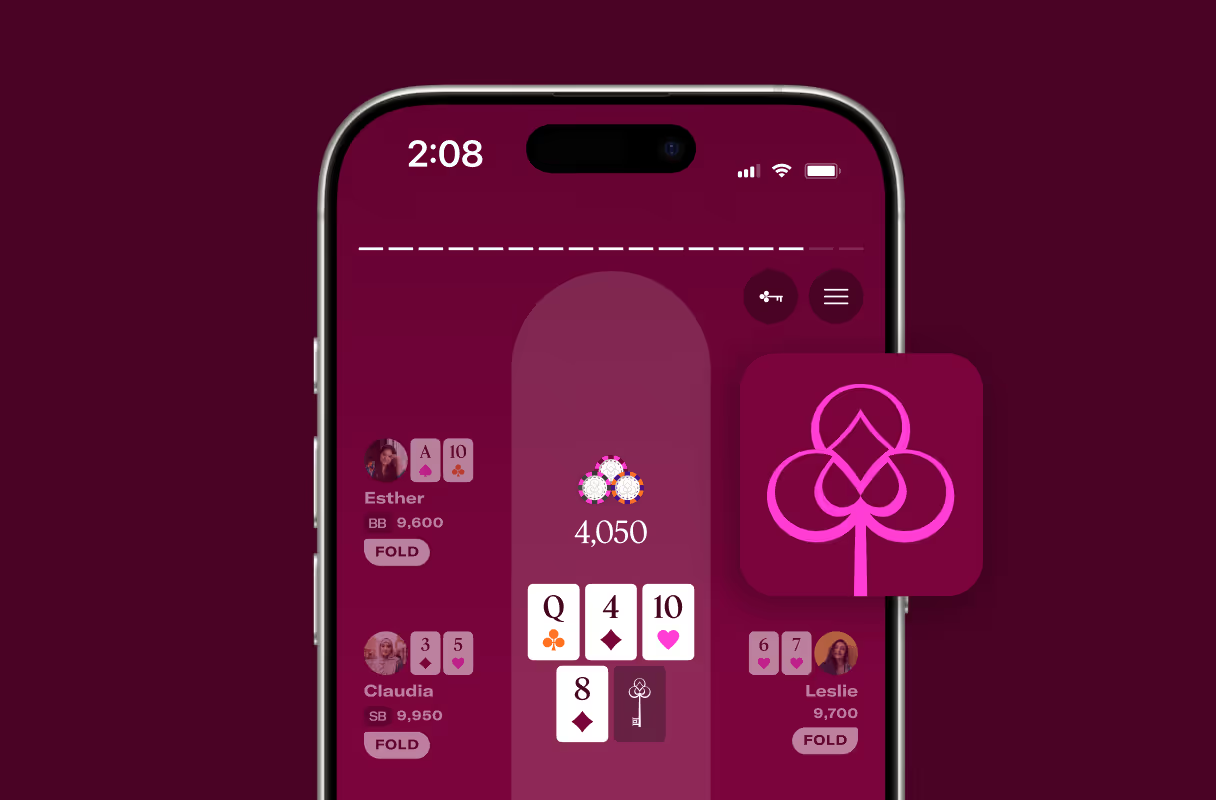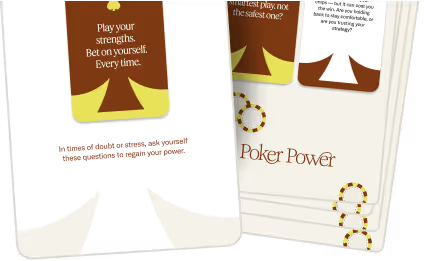Dr. Gail Berger is a professor at the Kellogg School of Management at Northwestern University and the Deputy Director of the Kellogg Center for Executive Women. She also teaches at the McCormick School of Engineering at Northwestern University. We had the opportunity to speak with Professor Berger about experiential learning, women’s advancement, and Kellogg’s partnership with Poker Power. Here is our conversation.
Poker Power (PP:) When you collaborated to develop Poker Power’s Kellogg program, what were the highest priorities for you?
Gail Berger (GB:) I wanted to create a learning experience that stuck with students and caused behavior change through an engaging medium. I think of the tagline in my approach to teaching as: I want to make learning fun through intentionality and purpose. I saw this partnership with Poker Power as a perfect opportunity to make that perspective and objective of mine come to life.
PP: In your academic career exploring negotiation, decision-making and organizational management, what skills in poker do you see as valuable and transferable to business leaders?
GB: The list could go on and on but decision making, negotiation, and emotional intelligence are the overarching buckets. Then there are a lot of specifics, concepts and topics within each one of those buckets.
PP: Could you go more into how poker nurtures emotional intelligence?
GB: So when I think about emotional intelligence I think of four different dimensions. There’s the idea of self-awareness, self-management, other-awareness and other-management or social interaction. And if you think about emotional intelligence in that way, really all facets come into play in poker.
There’s understanding yourself, understanding how you’re reacting to what’s happening, ensuring that you can then manage your reaction, and the poker term which I love is “tilt”, not being on tilt and not letting your emotions get the best of you.
You’re very much also paying attention to what other players at the table are doing. Are they giving off anything, what are their micro-expressions or in poker language “tells”, what can you learn about their hand? And then of course, using that information and your awareness of others to manage the dynamic between people.
PP: Do you expect peer universities to embrace experiential learning to the degree that Kellogg has in programs like this?
GB: I think that Kellogg is a leader and has always been a leader. I would love to think that we are now leading the way for this particular avenue and ability to engage and educate others. The idea though of using experiences, whether it’s simulation or roleplay or even a notion of gamification is not new.
This (program) is a unique application. So as much as I believe Kellogg is a leader, will more peer institutions employ this? I don’t know. I will say that experiential learning has always been important to me. As you might imagine when the pandemic hit, for a moment I was feeling like a deer in the headlights. Like “oh my goodness, everything that I’ve always done! How am I going to do this now?”
Fortunately there are a lot of great ways to translate a lot of those experiences to a virtual environment, which I’ve been grateful for. And specifically when we think about poker, this program has been all virtual.
PP: How have the talents and aspirations of the MBA students you’ve taught changed over the 18 years you’ve been with Kellogg?
GB: There are more non-traditional paths that our MBAs take now and more demand for careers/jobs that didn’t exist before. This is borne out of changes to different industries, availability of traditional career paths, and student interest. For example, Kellogg just launched MBAi, a joint program between the business and engineering schools.
PP: In your opinion, will issues like the wage gap and CEO representation improve for women in coming decades? How might this happen?
GB: Unfortunately Covid had a disproportionately negative impact on women in the workplace. I’ve heard that it’s been as horrible as the loss of all of the gains that have been made in the past 5-10 years and maybe even more. To me that is frightening. Do I think this will get better in the very near term? Probably not because of the pandemic.
Now, I juxtapose that against the reality of society being much more cognizant of women’s ability to step in and a changing work environment. There’s obviously a huge focus of attention now on diversity and inclusion efforts, of which women fall into a part of.
So where this shakes out with all of the variables at play? I’m not sure, I think that we need to be deliberate about using this time and these conditions to our benefit and make things happen.
PP: What resources would you recommend our readers explore to become more impactful team members and leaders?
GB: There is going to be a book coming out about negotiations by my mentor, Victoria Medvec, that I would be remiss not to mention titled “Negotiations Without Fear.” I’ve had an opportunity to read it and if someone is wondering how to become a better negotiator that is one I would definitely recommend.
Maria Konnikova, who is also part of the Poker Power program, recently came out with a book called “The Biggest Bluff” and that highlights a lot of the decision-making biases and challenges we talk about in the program. That’s a great read and there’s also a lot of poker intertwined.
PP: In your consulting practice, have you ever recommended playing poker on a retreat to improve a corporation’s management, communication and stakeholder relations?
GB: I do leadership coaching work and I’ve talked with people about the benefits of this program in this context. In all fairness, it’s only been six months since I have been so immersed (in poker) so that has limited where those opportunities have come up.
PP: Can you give us a snapshot of Kellogg’s Center for Executive Women? What it does and who it serves?
GB: It’s really about helping to prepare and elevate women to the highest level within organizations with a specific lens toward fortune-500 companies. We have a couple of flagship programs, executive education programs, women's senior leadership programs, which are about preparing women for increasingly senior level roles in organizations.
We are targeting women who are already at more senior roles and are looking to be promoted to the highest level. We’ve got the cohort program of women who come to Kellogg four times throughout the course of the year. These women form strong bonds and build a great network. And related to that, we really try to foster a strong community knowing that, for women in particular, having a network of support is critical towards their success and being able to achieve those career goals.
The second program of the center is a women’s director development program where we are helping women prepare and obtain positions as directors on boards, specifically on Fortune 500 boards. Women are very poorly represented on boards, which is a catch-22 because many companies looking for new directors are looking for people who have served in these sorts of positions. So if women haven’t been on boards then women won’t be made directors at those types of companies.
Poker Power is for educational purposes and does not permit gambling in our clubs. No poker experience is required.





